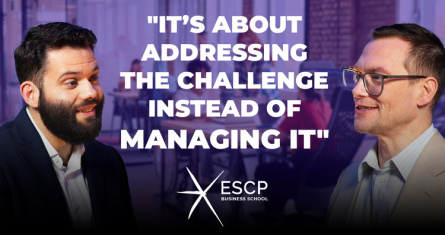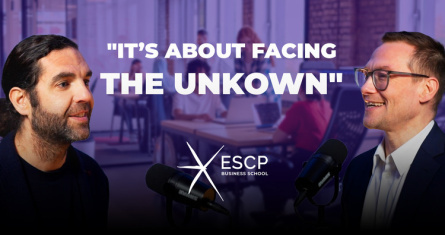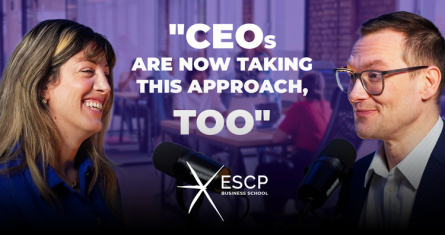ESCP Edge with Prof. Emmanuelle Léon
In this first episode of the ESCP Edge vodcast, Professor Emmanuelle Léon shares insights on hybrid work, employee productivity, and talent retention.
The evolving work environment continues to fuel debate: should companies bring employees back to the office full time or maintain a hybrid model? Professor Emmanuelle Léon brings a data-driven perspective that challenges the prevailing media narrative. She is an Associate Professor of Human Resource Management at ESCP Business School and Scientific Director of the Reinventing Work Chair, a partnership with Bivwak! and BNP Paribas, within the ESCP Leadership & Inclusive Management Institute.
What the data really says about returning to the office
Recent media coverage has focused on big companies calling employees back to the office, but Léon points out that the data tells a different story. “There's a lot of news, but the numbers show that there are very few workers that actually have come back to the office,” she shares. Despite the headlines, the proportion of hybrid workers has remained constant over the past two years
According to Léon, companies face challenges if they demand a full-time return to the office. "Most experts don't believe in the 'back to the office' trend for several reasons. First, companies lack the space to accommodate everyone. Second, forcing employees back implies a lack of trust in remote work, creating a more controlling environment, which doesn't appeal to younger generations,” adds Léon.
Léon warns that a perceived lack of trust may ultimately lead to the loss of valuable employees. “Companies that push this agenda risk losing top talent, something they can't afford right now."
Productivity and remote work: what the research shows
A common question in the hybrid work debate concerns productivity. Are workers truly less productive outside the office? Does data exist about the difference in productivity between remote, hybrid and in-person workers? "Yes, there are [data], mostly in the US, though I don’t think the trend would differ much in Europe. What we've seen is that the difference between hybrid and full-time office work is minimal—only about 1 or 2%. The major drop in productivity, around 10%, happens with full-time remote workers."
These findings suggest that while a full-time remote work setup might result in a decline in productivity, the gap between hybrid and full-time office work is minimal. When weighed against the significant costs associated with maintaining office space, even a small productivity difference can be less impactful from a financial standpoint. "Remember that real estate is expensive,” Leon adds. “So even if productivity drops by 10%, some see it as a trade-off for savings on real estate.”
What top management is still missing about employee engagement
In today’s evolving workplace, another pressing concern is employee engagement and retention. How does hybrid work influence a company’s ability to attract and retain top talent?
"The real issue with hybrid work isn’t productivity—it’s more about attraction, retention, and engagement,” Leon explains. “When you take away flexibility, something people highly value, you risk losing them. The key challenge is not productivity, but attracting and retaining your top talent."
Léon’s insights reinforce that flexibility is not merely a desirable perk—it’s a fundamental element for maintaining a committed workforce. Hybrid work models, therefore, are not just a temporary solution but a strategic approach to managing operational costs and addressing modern employee needs. Companies that understand and integrate these dynamics are better positioned to secure the talent necessary for long-term success in today’s competitive market.
However, Léon also cautions against treating flexibility as a cure-all. “Flexibility is a given. If I take flexibility away from you, you’re going to be very unhappy with me. If I give it to you, you’re not going to be motivated to work.” In other words, flexibility helps prevent dissatisfaction—but it doesn’t create engagement. As she puts it plainly: “Flexibility is a necessary condition, but it’s not enough.”
The real issue with hybrid work isn’t productivity—it’s more about attraction, retention, and engagement. When you take away flexibility, something people highly value, you risk losing them. The key challenge is not productivity, but attracting and retaining your top talent.
 Emmanuelle Léon
Emmanuelle LéonScientific Director of the Reinventing Work Chair and Associate Professor of Work & Human Relations
ESCP Paris Campus
Campuses



